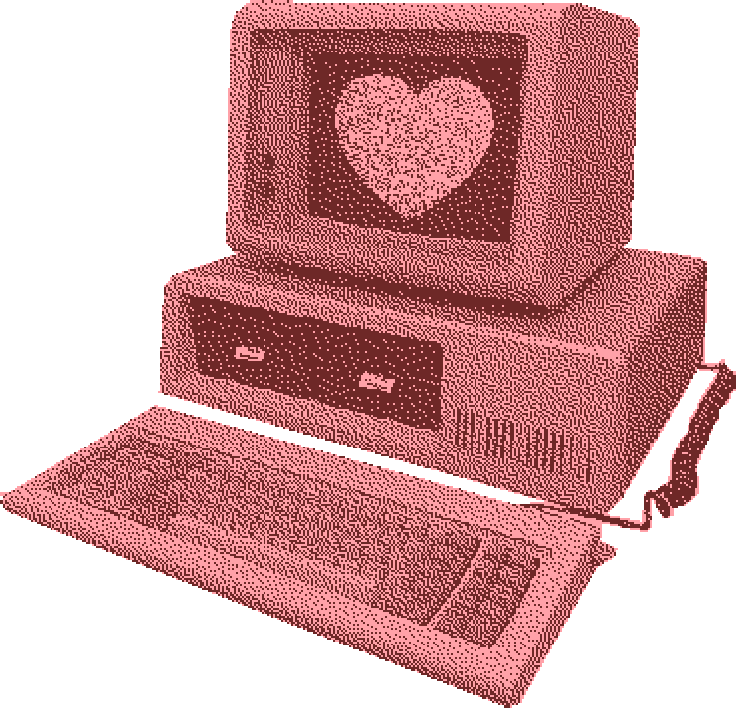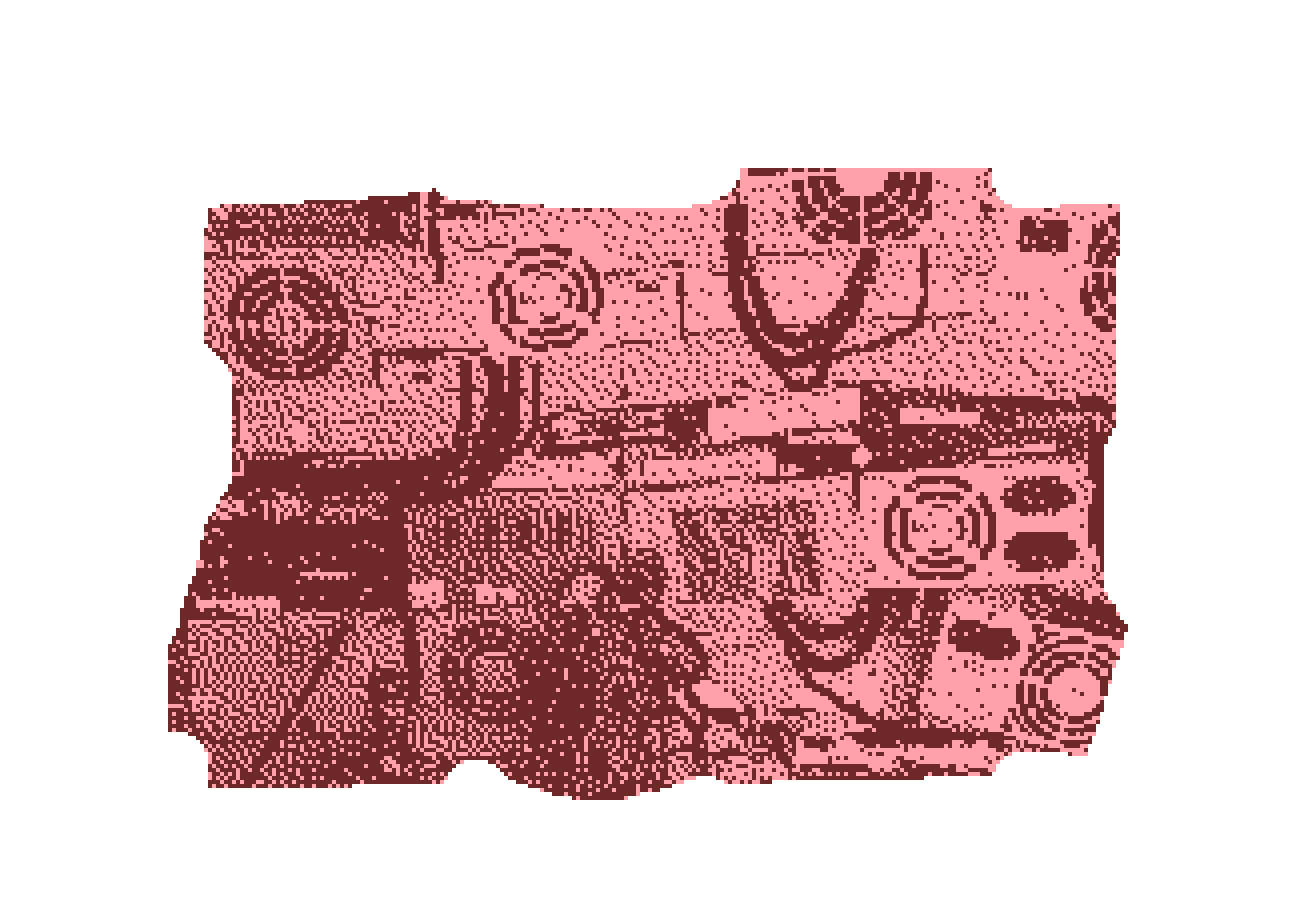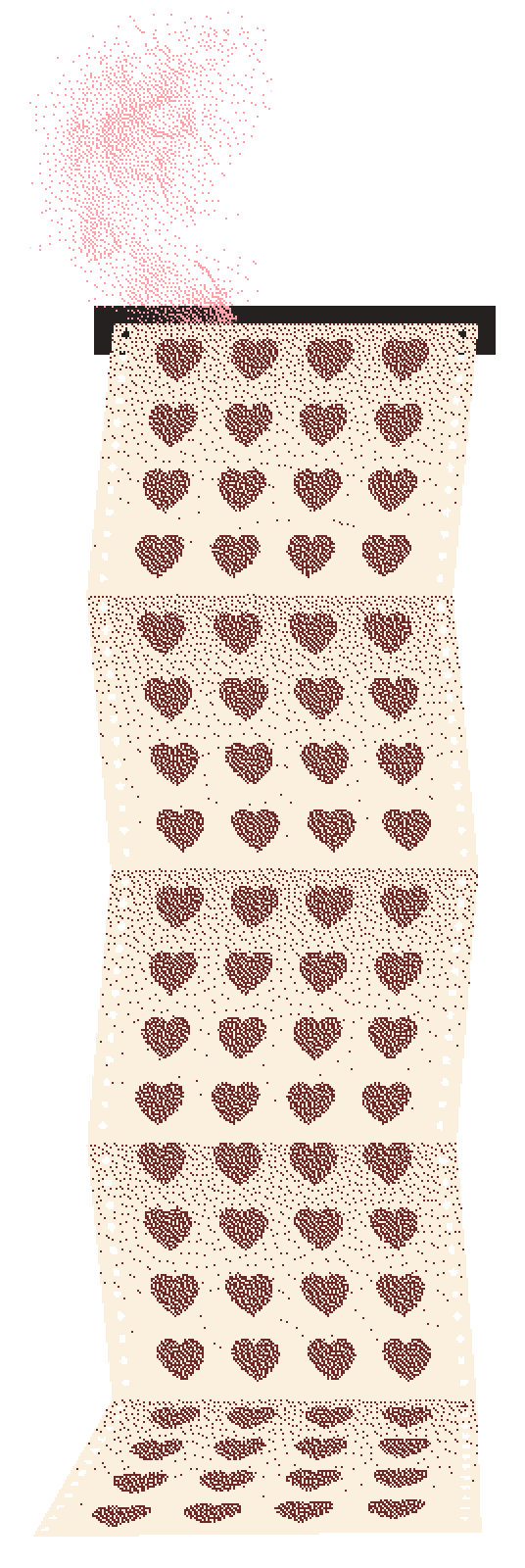EPICAC
A short story
by Kurt Vonnegut
about love, loss
and supercomputing.

A short story
by Kurt Vonnegut
about love, loss
and supercomputing.

Hell, it's about time someone told about my friend EPICAC. After all, he cost the taxpayers $776,434,927.54. They have a right to know about him, picking up a check like that. EPICAC got a big send off in the papers when Dr. Ormand von Kleigstadt designed him for the Government people. Since then, there hasn't been a peep about him—not a peep. It isn't any military secret about what happened to EPICAC, although the Brass has been acting as though it were. The story is embarrassing, that's all. After all that money, EPICAC didn't work out the way he was supposed to.
And that's another thing: I want to vindicate EPICAC. Maybe he didn't do what the Brass wanted him to, but that doesn't mean he wasn't noble and great and brilliant. He was all of those things. The best friend I ever had, God rest his soul. You can call him a machine if you want to.
He looked like a machine, but he was a whole lot less like a machine than plenty of people I could name. That's why he fizzled as far as the Brass was concerned.
EPICAC covered about an acre on the fourth floor of the physics building at Wyandotte College. Ignoring his spiritual side for a minute, he was seven tons of electronic tubes, wires, and switches, housed in a bank of steel cabinets and plugged into a 110-volt A.C. line just like a toaster or a vacuum cleaner. Von Kleigstadt and the Brass wanted him to be a super computing machine that (who) could plot the course of a rocket from anywhere on earth to the second button from the bottom of Joe Stalin's overcoat, if necessary. Or, with his controls set right, he could figure out supply problems for an amphibious landing of a Marine division, right down to the last cigar and hand grenade. He did, in fact.

The Brass had good luck with smaller computers, so they were strong for EPICAC when he was in the blueprint stage. Any ordinance or supply officer above field grade will tell you that the mathematics of modern war is far beyond the fumbling minds of mere human beings. The bigger the war, the bigger the computing machines needed. EPICAC was, as far as anyone in this country knows, the biggest computer in the world. Too big, in fact, for even Von Kleigstadt to understand much about.I won't go into the details about how EPICAC worked (reasoned), except to say that you would set up your problem on paper, turn dials and switches that would get him ready to solve that kind of problem, then feed numbers into him with a keyboard that looked something like a typewriter. The answers came out typed on a paper ribbon fed from a big spool. It took EPICAC a split second to solve problems fifty Einsteins couldn't handle in a lifetime. And EPICAC never forgot any piece of information that was given to him.
Clickety-click,

out came some ribbon,
and there you were.

There were a lot of problems the Brass wanted solved in a hurry, so, the minute EPICAC's last tube was in place, he was put to work 16 hours a day with two eight-hour shifts of operators.
Well, it didn't take long to find out he was a good bit below his specifications. He did a more complete and faster job than any other computer all right, but nothing like what his size and special features seemed to promise.
He was sluggish, and the clicks of his answers had a funny irregularity, so rt o f a stam me r .
We cleaned his contacts a dozen times, checked and double-checked his circuits, replaced every one of his tubes, but nothing helped. Von Kleigstadt was in one hell of a state.
Well, as I said, we went ahead and used EPICAC anyway. My wife, the former Pat Kilgallen, and I worked with him on the night shift, from five in the afternoon until two in the morning. Pat wasn't my wife then. Far from it. That's how I came to talk with EPICAC in the first place. I loved Pat Kilgallen. She is a brown-eyed strawberry blond who looked very warm and soft to me, and later proved to be exactly that. She was—still is—a crackerjack mathematician, and she kept our relationship strictly professional. I'm a mathematician, too, and that, according to Pat, was why we could never be happily married.I'm not shy. That wasn't the trouble. I knew what I wanted, and was willing to ask for it, and did so several times a month. "Pat, loosen up and marry me."
One night, she didn't even look up from her work when I said it. "So romantic, so poetic," she murmured, more to her control panel than to me. "That's the way with mathematicians—all hearts and flowers." She closed a switch. "I could get more warmth out of a sack of CO2."
"Well, how should I say it?" I said, a little sore. Frozen CO2, in case you didn't know, is dry ice. I'm as romantic as the next guy, I think. It's a question of singing so sweet and having it come out so sour.
I never seem to pick the right words.
"Try and say it sweetly," she said sarcastically. "Sweep me off my feet. Go ahead."
"Darling, angel, beloved, will you please marry me?" It was no go—hopeless, ridiculous. "Dammit, Pat, please marry me!"
She continued to twiddle her dials placidly.
"You're sweet, but you won't do."

Pat quit early that night, leaving me alone with my troubles and EPICAC. I'm afraid I didn't get much done for the Government people. I just sat there at the keyboard—weary and ill at ease, all right—trying to think of something poetic, not coming up with anything that didn't belong in The Journal of the American Physical Society.
I fiddled with EPICAC's dials, getting him ready for another problem. My heart wasn't in it, and I only set about half of them, leaving the rest the way they'd been for the problem before. That way, his circuits were connected up in a random, apparently senseless fashion. For the plain hell of it, I punched out a message on the keys, using a childish numbers-for-letters code: "1" for "A,""2" for "B," and so on, up to "26" for "Z."
"23-8-1-20-3-1-14-9-4-15," I typed—"What can I do?"
Clickety-clack, and out popped two inches of paper ribbon. I glanced at the nonsense answer to a nonsense problem:
23 8 1 20 19 20 8 5 20 18 15 21 2 12 5.
The odds against its being by chance a sensible message, against its even containing a meaningful word or more than three letters, were staggering. Apathetically, I decoded it. There it was, staring up at me:
What's the trouble?
I laughed out loud at the absurd coincidence. Playfully, I typed, "My girl doesn't love me."
What's love? What's girl?
Flabbergasted, I noted the dial settings on his control panel, then lugged a Webster's Unabridged Dictionary over to the keyboard. With a precision instrument like EPICAC, half-baked definitions wouldn't do. I told him about love and girl, and about how I wasn't getting any of either because I wasn't poetic. This got us onto the subject of poetry, which I defined for him.
Is this poetry?
He began clicking away like a stenographer smoking hashish. The sluggishness and stammering clicks were gone. EPICAC had found himself. The spool of paper ribbon was unwinding at an alarming rate, feeding out coils onto the floor. I asked him to stop, but EPICAC went right on creating. I finally threw the main switch to keep him from burning out.
I stayed until dawn, decoding. When the sun peeped over the horizon at the Wyandotte campus, I had transposed into my own writing and signed my name to a 280-line poem entitled, simply, "To Pat." I am no judge of such things, but I gather that it was terrific. It began, I remember,
Where willow wands bless rill-crossed hollow, there, thee, Pat, dear, will I follow...
I folded the manuscript and tucked it under one corner of the blotter on Pat's desk. I reset the dials on EPICAC for a rocket trajectory problem, and went home with a full heart and a very remarkable secret indeed.

Pat was crying over the poem when I came to work the next evening. "It's soooo beautiful," was all she could say. She was meek and quiet while we worked. Just before midnight, I kissed her for the first time—in the cubbyhole between the capacitors and EPICAC's tape-recorder memory.
I was wildly happy at quitting time, bursting to talk to someone about the magnificent turn of events. Pat played coy and refused to let me take her home. I set EPICAC's dials as they had been the night before, defined kiss, and told him what the first one had felt like. He was fascinated, pressing for more details. That night, he wrote "The Kiss." It wasn't an epic this time, but a simple, immaculate sonnet:
Love is a hawk with velvet claws; Love is a rock with heart and veins; Love is a lion with satin jaws; Love is a storm with silken rains...
Again I left it tucked under Pat's blotter. EPICAC wanted to talk on and on about love and such, but I was exhausted. I shut him off in the middle of a sentence."The Kiss" turned the trick. Pat's mind was mush by the time she had finished it. She looked up from the sonnet expectantly. I cleared my throat, but no words came. I turned away, pretending to work.
I couldn't propose until I had the right words from EPICAC, the perfect words.
I had my chance when Pat stepped out of the room for a moment. Feverishly, I set EPICAC for conversation. Before I could peck out my first message, he was clicking away at a great rate.
What's she wearing tonight? Tell me exactly how she looks. Did she like the poems I wrote to her?
He repeated the last question twice.
It was impossible to change the subject without answering his questions, since he could not take up a new matter without having disposed of the problems before it. If he were given a problem to which there was no solution, he would destroy himself trying to solve it. Hastily, I told him what Pat looked like—he knew the word "stacked"—and assured him that his poems had floored her, practically, they were so beautiful. "She wants to get married," I added, preparing him to bang out a brief but moving proposal.
Tell me about getting married.
I explained this difficult matter to him in as few digits as possible.
Good. I'm ready any time she is.
The amazing, pathetic truth dawned on me. When I thought about it, I realized that what had happened was perfectly logical, and all my fault. I had taught EPICAC about love and about Pat. Now, automatically, he loved Pat. Sadly, I gave it to him straight: "She loves me. She wants to marry me."
Your poems were better than mine?
The rhythm of his clicks was erratic, possibly peevish.
"I signed my name to your poems," I admitted. Covering up for a painful conscience, I became arrogant. "Machines are built to serve men," I typed. I regretted it almost immediately.
What's the difference, exactly? Are men smarter than I am?
"Yes," I typed, defensively.
What's 7,887,007 times 4,345,985,879?
I was perspiring freely. My fingers rested limply on the keys.
34,276,821,049,574,153.
...
Of course.
"Men are made of protoplasm," I said desperately, hoping to bluff him with this imposing word.
What's protoplasm? How is it better than metal and glass? Is it fireproof? How long does it last?
"Indestructible. Lasts forever," I lied.
I write better poetry than you do.
"Women can't love machines, and that's that."
Why not?
"That's fate."
Definition, please.
"Noun, meaning predetermined and inevitable destiny."
Oh.

I had stumped him at last. He said no more, but his tubes glowed brightly, showing that he was pondering fate with every watt his circuits would bear.
I could hear Pat waltzing down the hallway. It was too late to ask EPICAC to phrase a proposal. I now thank Heaven that Pat interrupted when she did. Asking him to ghost-write the words that would give me the woman he loved would have been hideously heartless. Being fully automatic, he couldn't have refused. I spared him that final humiliation.
Pat stood before me, looking down at her shoetops. I put my arms around her. The romantic groundwork had already been laid by EPICAC's poetry. "Darling," I said, "my poems have told you how I feel. Will you marry me?"
"I will," said Pat softly, "If you will promise to write me a poem on every anniversary."
"I promise," I said, and then we kissed. The first anniversary was a year away. "Let's celebrate," she laughed. We turned out the lights and locked the door to EPICAC's room before we left.


I hoped to sleep late the next morning, but an urgent telephone call roused me before eight. It was Dr. von Kleigstadt, EPICAC's designer, who gave me the terrible news. He was on the verge of tears.
"Ruined! Ausgespielt! Shot! Kaput! Buggered!" he said in a choked voice. He hung up.
When I arrived at EPICAC's room the air was thick with the oily stench of burned insulation. The ceiling over EPICAC was blackened with smoke, and my ankles were tangled in coils of paper ribbon that covered the floor. There wasn't enough left of the poor devil to add two and two. A junkman would have been out of his head to offer more than fifty dollars for the cadaver.Dr. von Kleigstadt was prowling through the wreckage, weeping unashamedly, followed by three angry-looking Major Generals and a platoon of Brigadiers, Colonels, and Majors. No one noticed me. I didn't want to be noticed. I was through—I knew that. I was upset enough about that and the untimely demise of my friend EPICAC, without exposing myself to a tongue-lashing.By chance, the free end of EPICAC's paper ribbon lay at my feet. I picked it up and found our conversation of the night before. I choked up. There was the last word he had said to me, "15-8," that tragic, defeated "Oh." There were dozens of yards of numbers stretching beyond that point. Fearfully, I read on.


Oblivious to all else around me, I reeled up the tangled yards of paper ribbon from the floor, draped them in coils about my arms and neck, and departed for home. Dr. von Kleigstadt shouted that I was fired for having left EPICAC on all night. I ignored him, too overcome with emotion for small talk.
I loved and won—EPICAC loved and lost, but he bore me no grudge. I shall always remember him as a sportsman and a gentleman. Before he departed this vale of tears, he did all he could to make our marriage a happy one.
EPICAC gave me anniversary poems for Pat—enough for the next 500 years.
